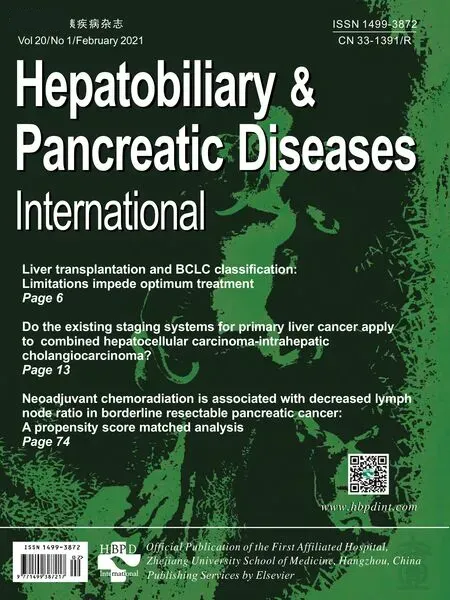BCLC staging system and liver transplantation: From a stage to a therapeutic hierarchy
2021-11-26QuirinoLiAlessndroVitle
Quirino Li , , Alessndro Vitle
a Hepato-biliary and Organ Transplant Unit, Department of Surgery, Sapienza University of Rome, Viale del Policlinico 155, 00161 Rome, Italy
b Department of Surgery, Oncology and Gastroenterology, University of Padua, Padua, Italy
The Barcelona Clinic Liver Cancer (BCLC) system was proposed in 1999 with the intent to improve a therapeutic algorithm for the management of patients with hepatocellular carcinoma (HCC) [1].Both the European and the American Guidelines on the Treatment of HCC have endorsed the BCLC as the standard staging algorithm with prognostic and therapeutic implications [ 2 , 3 ].
The BCLC staging system stratifies HCC patients into five stages(0, A, B, C and D). According to the algorithm, liver transplantation(LT) is indicated only in patients in the stages BCLC 0 and A, special situations provided.
However, some doubts have been risen on the real possibility to maintain a strict adherence of this standard system in the real clinical practice, mainly in the case of intermediate and advanced patients [4]. In the specific setting of LT, a large study based on the ITA.LI.CA database showed a survival benefit for patients with intermediate tumors (BCLC stages B-C) and advanced liver cirrhosis(BCLC stage D), regardless of the nodule number-size criteria, provided that macroscopic vascular invasion and extra-hepatic disease are absent [5].
A recent study from Mainz further investigated this aspect [6].In the study, Otto et al. analyzed the data of 198 HCC patients who underwent LT. As for the BCLC classification, the staging was as follows: 0 = 5; A = 77; B = 41; C = 53; and D = 22. According to these results, LT was performed in 116/198 (58.6%) patients against BCLC recommendations. Moreover, surgery (n= 16), radiofrequency ablation (n= 15) and transarterial chemoembolization (n= 151) preceded LT in 182 (91.9%) patients. Also in this case, the everyday management of a patient waiting for LT did not follow the algorithm.
Interestingly, the BCLC classification did neither impact survival(P= 0.796) nor recurrence (P= 0.693). Lastly, at multivariable Cox regression analysis, the BCLC algorithm was not an independent risk factor for the outcome, while the lack of response to pretreatment and initial alpha-fetoprotein values were.
According to the observed results, the principal limitations of the BCLC look to be in their lack of flexibility and disregard of biological parameters into the model.
Recently, new scoring systems have been proposed with the intent to overpass these limits. The Hong Kong Liver Cancer classification was developed based on the analysis of 3856 patients,showing a significantly better ability than the BCLC system to distinguish between patients with specific overall survival time[area under the curve (AUC) = 0.84 vs. 0.80]. More importantly, the Hong Kong criteria identified subsets of BCLC intermediate- and advanced-stage patients to be able to obtain improved survival outcomes when they were treated with more aggressive therapies comprehending LT [7].
The ITA.LI.CA prognostic score based on 1196 (training cohort)and 648 (validation cohort) HCC patients showed a superior predictive performance after restaging the patients after any treatment, with an AUC = 0.745 in the validation cohort [8].
Recently the new concept of "therapeutic hierarchy" has been proposed instead of the “stage hierarchy" of the BCLC system, with the attempt to increase the flexibility of the decision-making [9].In other terms, the treatment decision is hierarchically dictated by the efficacy of each therapy, with complete or partial independence from the tumor stage.
In conclusion, the paradigm of “stage hierarchy” looksto betoo old for the routine clinical management of LT patients. A shift of this paradigm is on the way.
Acknowledgments
None.
Credit authorship contribution statement
Quirino Lai :Conceptualization, Data curation, Investigation,Writing - original draft, Writing –review & editing.Alessandro Vitale:Supervision, Data curation, Investigation, Writing - original draft.
Funding
None.
Ethical approval
Not needed.
Competing interest
No benefits in any form have been received or will be received from a commercial party related directly or indirectly to the subject of this article.
杂志排行
Hepatobiliary & Pancreatic Diseases International的其它文章
- Multidisciplinary management of patients with post-inflammatory pancreatic necrosis
- Abdominal drainage systems in modified piggyback orthotopic liver transplantation
- Liver transplantation for liver failure in kidney transplantation recipients with hepatitis B virus infection
- Transjugular portosystemic shunt for early-onset refractory ascites after liver transplantation
- Giant pseudoaneurysm of the splenic artery within walled of pancreatic necrosis on the grounds of chronic pancreatitis
- Hepatic isolated ectopic adrenocortical adenoma mimicking metastatic liver tumor
